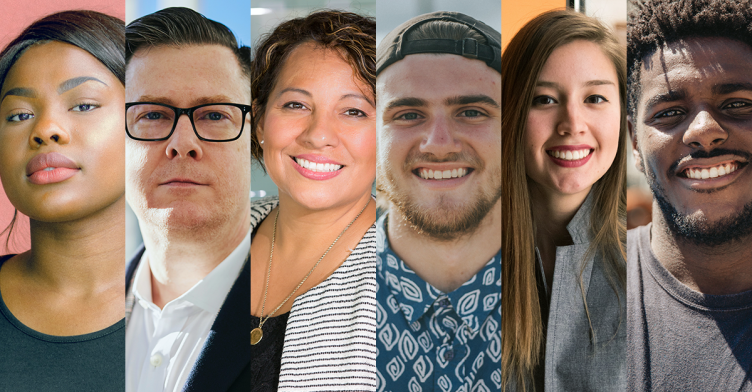
What do you need to be successful at your job?
There are many good answers to this question — but for most office workers, it’s likely that “a BS in marketing” or “four years of design school” didn’t top the list. Yet in an age of quick decisions and automated screening, lacking the right piece of paper and resume keywords disqualifies large swaths of talented job applicants before they even get to make their case.
Amid a sweeping reevaluation of our work lives, it’s time to rethink job qualifications. We don’t need to blow up the systems we’ve built, but when we focus on experience and pedigree over the actual people we’re hiring, we miss out on important perspectives. There’s a reason college admissions offices have begun prioritizing essays and other factors over standardized test scores: People are more than a quantifiable stat sheet.
Large organizations often need automation and other efficiencies to parse through the piles of applications they receive. But no organizations should be excused from finding scalable ways to diversify the backgrounds in their company and make hiring more equitable. Beyond the DEI case, overlooking “unqualified” applicants causes you to miss out on passionate, eager and innovative team members. If you set a clear company vision that trickles down to each role, it will always take more than AI to identify the right hire. As we reshape hiring processes, here are principles I think we should keep in mind.
Ask Why
Too often, organizations set out to find the right person for a role before defining why they’re hiring in the first place. If the best you can do is “getting stuff off my calendar” or “taking work I don’t want,” it’s going to be tough to find good candidates and set them up for success. At the risk of sounding like a broken record, effective hiring also starts with the design thinking principle of “question everything.”
As much as possible, try to avoid the “hiring to fill a role” mentality. When you look at the job, what does someone actually need to do well? If you’re not disciplined in what you’re looking for in a role, your judgment can get clouded by good rapport or flashy credentials. A helpful way to think of the hiring process is welcoming someone into your group who needs to be fulfilled, taken care of and given the tools to thrive. When you look at it this way, your qualifications might morph — none of those actions require a college degree.
Decentralize Hiring
In a previous job, I once hired a good friend. We got along well and shared many of the same strengths, but that also meant similar weaknesses. I quickly learned that having one person — or one type of person — in charge of hiring is dangerous, causing you to assemble a team of clones that think and act the same way. Today, I’m proud to say that the Brooks Bell executive team spans the DiSC work style spectrum, and our organization is stronger because of it.
From personalities to professional backgrounds, organizations need diverse employees in order to challenge the status quo and move forward. Especially as a consultancy, different thinkers are essential to approaching client problems from every angle. If we work with a dollar store, for example, a team of upper middle-class Ivy League alumni might come to the table without the familiarity and understanding of employees from the rural Midwest.
To avoid hiring a full staff of Greg Ngs, we have split up hiring into a three-part evaluation. One person looks for technical capability, another for culture fit and a third for team compatibility. As a small organization, each of these factors is equally important to our success, so new hires require a unanimous “yes.” Wherever possible, find ways to avoid one person (or AI) software disqualifying candidates. The “right hire” is never a single type of person — and innovative organizations recognize diversity as a strength.
Evaluate Intangibles
Early in my career, I was searching for a designer. We got a ton of resumes, but none seemed like the right fit. A few weeks later, a young designer who’d been rejected came up to me at a “tweetup.” He introduced himself and asked if we could get coffee so he could get a better sense of what we were looking for. We got coffee, and then I hired him. He didn’t have relevant college experience and his portfolio was just OK — but he turned out to be one of the best hires I’ve made. His preparation, attitude and eagerness told me more about him than an application form fill ever could.
When I conduct interviews, I care less about what the person knows or has done than about who they are as a person. I like to ask disarming questions that get down to their values, goals and approach to life. To me, someone who is aware of their weaknesses and is invested in improvement is a much stronger candidate than someone with a spotless GPA or big-name employer. There is a minimum level of craft needed to get in the door, but once they’re there, I care more about if they bring a fire or intangible I can’t find elsewhere. We hire whole people, not anthropomorphized job descriptions.
There’s a reason universities (including those in Brooks Bell’s backyard) are deprioritizing standardized testing for applicants. Personal essays and extracurricular involvement tell you much more about a student than a Scantron-calculated number. I view hiring the same way. For candidates pursuing a doctorate, for example, I’m more interested in what this higher learning investment says about them than if they’ve received the diploma.
We have people in our organization who are former teachers or have otherwise never worked in this business before. These perspectives are invaluable and essential to smart client work — and without a flexible hiring process, they’d never even be in the room.
Changing the Standards
In recent years, we’ve seen high-profile examples of programs to train and hire formerly incarcerated people, military veterans, disabled people, mothers returning to the workforce and more. These great initiatives are all examples of organizations recognizing underrepresented communities and being intentional about bringing them into the fold. Now, we have the opportunity to continue this work on a broader level. This inclusion shouldn’t have to be an exception or special program, it should be built into the way we recruit and hire.
For the majority of office-work organizations, you don’t need a specialized certification or degree. They aren’t drawbacks, and this educational background also adds value to your team. But to me, the most important factors are ambition and drive — most other things can be learned. In this “Great Re-evaluation,” we cannot and should not tolerate a workforce without diversity. We can’t let automation and longstanding biases keep us from talented candidates with new perspectives.
So what do we need to succeed in our jobs? We need a strong work ethic, a hunger to succeed and the support to bring our true selves to work — none of which show up on a resume.
Interested in working at Brooks Bell but not sure you’re qualified? Don’t disqualify yourself. Message me and let’s talk.
